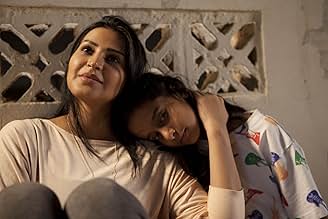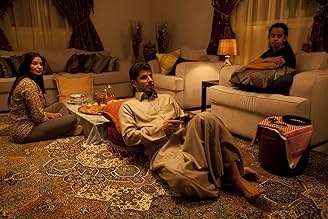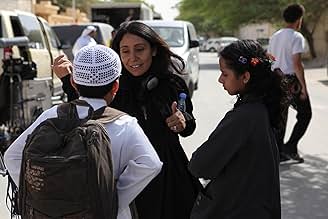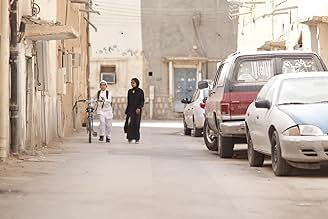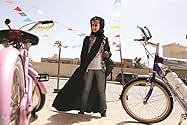CALIFICACIÓN DE IMDb
7.5/10
22 k
TU CALIFICACIÓN
Una niña saudita emprendedora se inscribe en la competencia de recitación del Corán de su escuela como una forma de recaudar los fondos faltantes que necesita para comprar la bicicleta verde... Leer todoUna niña saudita emprendedora se inscribe en la competencia de recitación del Corán de su escuela como una forma de recaudar los fondos faltantes que necesita para comprar la bicicleta verde que ha captado su interés.Una niña saudita emprendedora se inscribe en la competencia de recitación del Corán de su escuela como una forma de recaudar los fondos faltantes que necesita para comprar la bicicleta verde que ha captado su interés.
- Dirección
- Guionista
- Elenco
- Nominada a1 premio BAFTA
- 22 premios ganados y 36 nominaciones en total
Abdullrahman Al Gohani
- Abdullah
- (as Abdullrahman Algohani)
Sara Al Jaber
- Leila
- (as Sara Aljaber)
- Dirección
- Guionista
- Todo el elenco y el equipo
- Producción, taquilla y más en IMDbPro
Opiniones destacadas
One thing that makes this movie stands out is the fact that it is entirely based in Saudi Arabia.
Regardless what one thinks of that country, be that knowledge or just stereotyping, it has a culture that is very different than that of what the western audience is accustomed to.
So he have a heroine who is your typical rebel teenage girl, who has realised that being a woman can be challenging and she therefore must give her fight to survive. The story revolves around an utterly sinful desire this young revolver has: to buy and ride a bicycle. To go about that, she must overcome her mum's objections, the shopkeeper's and pretty much everyone she is acquainted with.
Unprepared to simply accept fate, she is prepared to do whatever it takes to ride that bicycle. Quirky and witty, this is a delight and one should not allow any preconceived notions of Arabic culture to stand in the way of enjoying this pleasurable debut.
Wadjda is a hero in any culture.
Regardless what one thinks of that country, be that knowledge or just stereotyping, it has a culture that is very different than that of what the western audience is accustomed to.
So he have a heroine who is your typical rebel teenage girl, who has realised that being a woman can be challenging and she therefore must give her fight to survive. The story revolves around an utterly sinful desire this young revolver has: to buy and ride a bicycle. To go about that, she must overcome her mum's objections, the shopkeeper's and pretty much everyone she is acquainted with.
Unprepared to simply accept fate, she is prepared to do whatever it takes to ride that bicycle. Quirky and witty, this is a delight and one should not allow any preconceived notions of Arabic culture to stand in the way of enjoying this pleasurable debut.
Wadjda is a hero in any culture.
The director Haifaa Al-Mansour tells the tale of a child called Wadjda whose wish is to have her own bicycle so that she might race against her friend and neighbour Abeer. The only problem is that Wadjda is a girl and girls in Saudi society do not ride bikes, which are considered "boys' toys" ... As we follow Wadjda in her quest to find the money to purchase the bicycle she sees being delivered on the roof of a van, we are introduced to her society and its culture and, in particular, its treatment of girls and women. Al-Mansour's portrayal of her country is shown without heavy judgement, although the bitter sweetness of being female is not concealed.
Filmed on location in Saudi Arabia, a feat in itself in a country that does not have a film industry as films are considered sinful, Wadjda's desire represents the wish for female freedom; her lack of a bicycle is mirrored in the adult women's inability to drive, prohibited for women in Saudi Arabia, and the problems this creates for them. So the child's desire to ride a bike becomes a metaphor for freedom, which is the central theme in the film.
This is a subtle tale full of character, charm and complexities and not at all as one might expect. The young girl who carries the film, Waad Mohammed, is terrific and it is hard to believe that she was not an actress before appearing in this feature.
Does Wadjda achieve her desire and get her bike? Is she able to race it along the dusty roads as free as her friend Abeer and the other boys? Well, you will have to watch the film for the answers and in watching the film will support the director and the nascent film industry emerging from within Saudi Arabia.
Filmed on location in Saudi Arabia, a feat in itself in a country that does not have a film industry as films are considered sinful, Wadjda's desire represents the wish for female freedom; her lack of a bicycle is mirrored in the adult women's inability to drive, prohibited for women in Saudi Arabia, and the problems this creates for them. So the child's desire to ride a bike becomes a metaphor for freedom, which is the central theme in the film.
This is a subtle tale full of character, charm and complexities and not at all as one might expect. The young girl who carries the film, Waad Mohammed, is terrific and it is hard to believe that she was not an actress before appearing in this feature.
Does Wadjda achieve her desire and get her bike? Is she able to race it along the dusty roads as free as her friend Abeer and the other boys? Well, you will have to watch the film for the answers and in watching the film will support the director and the nascent film industry emerging from within Saudi Arabia.
We went to see this as a family, with our two daughters, 14 and 16. We all enjoyed it. Seeing how the limitations placed on women in Saudi Arabia play out in everyday life was of great interest to all of us. The story line depicted not only Wadjda's efforts to break free from her circumscribed world, but also how adult women struggle to survive. The effort to simply support oneself without a man when one can't even drive or wear clothes that allow for mobility reflects how rules ostensibly meant to "protect" women keep them dependent on men for the most rudimentary basics.
I suspect that even this film does not depict the lives of women in Saudi Arabia completely accurately. Some concessions seem to have been made to the government. No religious police are to be seen, for example. Nonetheless, it is well worth seeing, and we applaud Haifaa al-Mansour for making it. We look forward to her future work.
I suspect that even this film does not depict the lives of women in Saudi Arabia completely accurately. Some concessions seem to have been made to the government. No religious police are to be seen, for example. Nonetheless, it is well worth seeing, and we applaud Haifaa al-Mansour for making it. We look forward to her future work.
In a land where where cinemas are illegal, the first feature film shot entirely in Saudi Arabia by its first female director, 'Wadjda' is simple yet alluring neorealist film about a child and a bicycle. Haifaa Al-Mansour's brave effort gives us an interesting glimpse into the lives of women in a strict religious country like Saudi Arabia.
Being scolded for not wearing a head-scarf to school and for singing when her father's friends are in the other room (women unable to show themselves or their talents in presence of men), being sexually harassed by a building site worker, seeing her mother sad and angry because her dad is about to marry another woman (desperation for a male heir and the existence of polygamy), her mother almost losing her job because of her dependence on a rude driver (women are not allowed to drive any kind of transport), seeing one of her classmates getting married (rare but existent child marriages), seeing two elder schoolmates get wrongfully accused of immoral intimate conduct, and feeling disappointed after not seeing her name in the family tree (only male children are given importance); these are just few of the female struggles we see through the eyes of our young tomboy heroine, Wadjda. From the very first scene where she stands out in a group of singing school girls with her converse shoes, we see Wadjda as someone rebellious and strong. In a repressive land where women are oppressed, based on strict religious laws, not only by men but by other women as well, Wadjda dreams of having a green bicycle, so that she could overtake her annoying yet caring friend Abdullah. Though girls are not allowed to ride bikes, she starts collecting money by selling love-song mixed tapes and football club bracelets to her schoolmates. And thus begins her journey. Just like 'The Bicycle Thief', the bicycle here signifies freedom.
The young yet incredibly talented Waad Mohammed gives a charming performance, and carries the movie on her shoulders with terrific ease. Waad along with Haifaa (Director) are the two brave talents that emerge from this feature. All the supporting actors act commendably as well. International composer Max Richter's background score is subtle yet as captivating as the movie itself. Shot with such authentic beauty, there are many scenes which stay in your mind long after the movie is over, one of which is where the young friend Abdullah asks Wadjda, in an adorably sweet way, if she knows that he wants to marry her when they grow up; the scene has a lot of meaning and hope attached to it.
It's not just a critique on Saudi society, but it's a universal story which talks about a society's limitations and possibilities.
Being scolded for not wearing a head-scarf to school and for singing when her father's friends are in the other room (women unable to show themselves or their talents in presence of men), being sexually harassed by a building site worker, seeing her mother sad and angry because her dad is about to marry another woman (desperation for a male heir and the existence of polygamy), her mother almost losing her job because of her dependence on a rude driver (women are not allowed to drive any kind of transport), seeing one of her classmates getting married (rare but existent child marriages), seeing two elder schoolmates get wrongfully accused of immoral intimate conduct, and feeling disappointed after not seeing her name in the family tree (only male children are given importance); these are just few of the female struggles we see through the eyes of our young tomboy heroine, Wadjda. From the very first scene where she stands out in a group of singing school girls with her converse shoes, we see Wadjda as someone rebellious and strong. In a repressive land where women are oppressed, based on strict religious laws, not only by men but by other women as well, Wadjda dreams of having a green bicycle, so that she could overtake her annoying yet caring friend Abdullah. Though girls are not allowed to ride bikes, she starts collecting money by selling love-song mixed tapes and football club bracelets to her schoolmates. And thus begins her journey. Just like 'The Bicycle Thief', the bicycle here signifies freedom.
The young yet incredibly talented Waad Mohammed gives a charming performance, and carries the movie on her shoulders with terrific ease. Waad along with Haifaa (Director) are the two brave talents that emerge from this feature. All the supporting actors act commendably as well. International composer Max Richter's background score is subtle yet as captivating as the movie itself. Shot with such authentic beauty, there are many scenes which stay in your mind long after the movie is over, one of which is where the young friend Abdullah asks Wadjda, in an adorably sweet way, if she knows that he wants to marry her when they grow up; the scene has a lot of meaning and hope attached to it.
It's not just a critique on Saudi society, but it's a universal story which talks about a society's limitations and possibilities.
WADJDA is a straightforward tale of a young girl Wadjda (Waad Mohammed) growing up in a suburb of Riyadh, Saudi Arabia, who wants to buy a bicycle. Unable to find the money to do so, she enters a competition to speak the Koran in public with a substantial cash prize. After considerable time spent studying the text, she wins the competition, but sadly doesn't receive the money. In the end, however, she achieves her dreams - but not in the way she expects. Haifaa Al-Mansour's film is noteworthy for being a woman's film directed by a woman; it shows in careful detail the ways in which women's lives are constructed in Saudi Arabia, as well as showing how influential the Koran is in determining people's behavior. Some viewers might think that the women's lives are unfairly restricted; the film suggests that this is what many women believe is the right thing to do. By doing so, WADJDA shows how different people embraces different concepts of Islam. On the other hand, the film also suggests that individuals - especially children - should have at least some means to express themselves, particularly when they have worked to hard to achieve their aims. To restrict them is also to repress them; and this ultimately leads them to accept subordination as a way of life. WADJDA proves that the opposite should be true; not only for Wadjda herself but also for her mother (Reem Abdullah).
¿Sabías que…?
- TriviaBecause of restrictions placed on women in Saudi Arabia, director Haifaa Al-Mansour was not allowed to interact with her mostly male crew. She had to direct the street scenes from a nearby van, watching through a monitor and giving instructions via walkie-talkie.
- ErroresWhen Wadjda takes the bread out of the oven, mic equipment is visible on her waist, under her T-shirt.
- ConexionesFeatured in At the Movies: Venice Film Festival 2012 (2012)
- Bandas sonorasDead Island
© Copyright 2012 and Published by Deep Silver, a division of Koch Media
Gmbh, Gewerbegebiet 1, 6604 Hofen, Austria.
Developed 2011, Techland Sp, z.o.o., Poland,
© Copyright 2012, Chrome Engine, Techland Sp. z.o.o.
Selecciones populares
Inicia sesión para calificar y agrega a la lista de videos para obtener recomendaciones personalizadas
Detalles
Taquilla
- Total en EE. UU. y Canadá
- USD 1,347,747
- Fin de semana de estreno en EE. UU. y Canadá
- USD 41,253
- 15 sep 2013
- Total a nivel mundial
- USD 6,499,169
- Tiempo de ejecución1 hora 38 minutos
- Color
- Mezcla de sonido
- Relación de aspecto
- 1.85 : 1
Contribuir a esta página
Sugiere una edición o agrega el contenido que falta

Principales brechas de datos
What is the Japanese language plot outline for La bicicleta verde (2012)?
Responda






